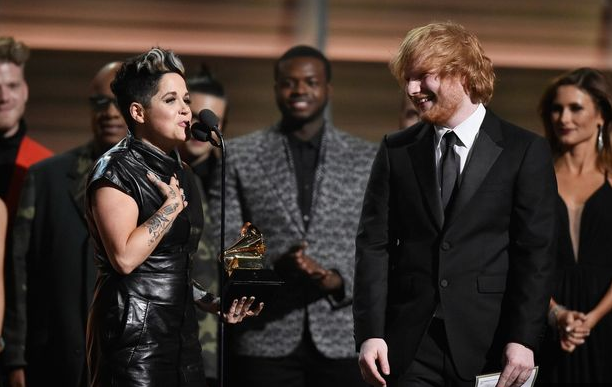We need to treat professional songwriters with the respect they deserve.
On Monday night, Ed Sheeran and Amy Wadge walked up to the Staples Center stage to accept a Grammy for the “Song of the Year” award, which is one of the four most prestigious Grammy awards given every year. The award recognizes excellent songwriting and is given to the composers of the most deftly crafted song of the year. Ed thanked the team who recorded the song, “Thinking Out Loud,” along with long-time collaborator Amy herself before motioning to Amy to give her own acceptance speech.
Then things went awry. In the carefully edited video provided by the Grammys’ official YouTube channel above, Amy walks towards the mic and the video ends. Those who actually watched the Grammys may recall that what happened on screen went a bit differently. Amy began to speak into the microphone and was immediately interrupted, as the show clumsily cut to a tribute to Glenn Fry by the remaining members of the Eagles. Viewers at home didn’t get to experience the audience reportedly booing throughout the performance—audibly upset that Amy Wadge, who has an extensive career as a solo artist, songwriter and producer—was not given any time to accept the award which she shares with Ed Sheeran.
In an untelevised segment backstage (above), Ed Sheeran told a reporter that he has been writing with Amy for over eight years (most notably co-writing his EP released in 2010, Songs I Wrote with Amy) and that both of them were overjoyed and shocked to receive the award. As the interviewer begins to ramble about the song’s impact, Ed interrupts. He holds Amy by the shoulder and asks, “Is this going out on TV? Because Amy didn’t get to do a speech.” Ed looks at Amy as he asks her, “you wanna do your speech now?” “They cut her off,” he explains to the interviewer.
Amy thanks her husband, children, manager, publishing company and Ed. She finishes still with a smile and an air of positivity. “Thank you for letting me do my speech.”
“Make sure you put that on TV as well,” Ed warns. “If you don’t I’ll find out and I’ll come for you.”
In the days after, the media praised Ed Sheeran, sometimes forgetting to mention Amy at all (like here), he received a touching tribute on Instagram from bff Taylor Swift and Amy brushed off her interruption in good spirits. The media focus rarely drifted to Amy’s interruption. If given the chance, I like to imagine that she could have told us some interesting tidbits about songcraft that we, as the American public, never really get. She could have told us about who wrote what, how that guitar part in the beginning came into fruition, or mentioned that “Thinking Out Loud” is the song that paid her mortgage bill. Maybe she could have told us what it has been like to work with Ed Sheeran for the past eight years. Maybe Amy could have given us insight into what it’s like to be a co-writer and topliner and explain how her own twenty five year career in music (she was signed at age 14) informs her own art. Instead, Amy, like many songwriters, was given the short-shrift. She was jovial even backstage and outpoured her gratefulness on Twitter, but it makes me think about how we present songwriters in the world today, particularly at the Grammys. Why are we only hearing from a songwriter who co-wrote “Thinking Out Loud” one time during the year, behind the curtain at the Staples Center?
The Grammys present one of the few opportunities for songwriters to present themselves in front of the public. Oftentimes Grammy award-winning songwriters like Amy Wadge are professionals with established careers who have turned their talent and hard work towards fostering younger, growing artists, either because they no longer want to perform, wish to branch out or were never performers to begin with. In 2014, for example, Joel Little and Lorde received Song of the Year for “Royals” (see above). In this speech, Joel Little, who headed his own band Goodnight Nurse and also co-wrote and produced everything on Lorde’s first album, is perhaps the rare exception of someone who gets a full speech on the Grammys stage. But in general, it seems like the Grammys are fine with keeping songwriters out of the public view, even though their efforts as collaborators are highly influential. It seems that collaborators are shunned for the sake of the image of the artist, who is made to appear somewhat like an autonomous superstar who rose through the ranks without outside influence. Yet, not since Coldplay’s win in 2010 has a Song of the Year winner not had a songwriter or two to collaborate with.
I think that age also has a huge part to do with Amy’s snub, and the general treatment of songwriters as backstage, behind-the-scenes talent. In a world where eternal youth is often glamorized and commercialized, Amy, who is turning 40 in just a few short weeks, is someone who the producers of the Grammys would prefer backstage despite the fact that her age and experience likely lent itself to the creation of “Thinking Out Loud” in the first place. Her unfortunate incident at the Grammys reminds me of a recent, “older” songwriter—Sia—who was only recently able to break into the mainstream by creating and performing her own certified pop bangers.
Sia is a a popstar who, like Amy, spent much of her career over the past 8 years writing songs for other artists (i.e. “Diamonds” for Rihanna, “Pretty Hurts” for Beyonce, “Perfume” for Britney Spears and many others). Sia is an absolutely incredible performer and writer in her own right, but it makes you wonder if her decision to hide her face in front of cameras and on stage is a tool to fight the media’s image of eternal youth in mainstream music, in addition to an artistic statement against fame (which she discusses in the video with James Corden, above). After all, when her single “Chandelier” was released in 2014, Sia was already 39 years old. Amy and Sia have similar songwriting prowess, but would someone like Sia, who has now paved her way as an artist with an anonymity that belies her age, ever have to deal with being interrupted at a major awards show and then relegated to a backstage interview, had she co-written a song that won a songwriting award? I would hope that “older” and less well-known songwriters would be able to get their time to shine on stage, especially at the Grammys, where they are allowed to peek out behind the curtain of the mainstream music industry. We need to pay attention to both artists and the songwriters that helped them get where they are today.
-Shane


Some truly choice posts on this website, bookmarked.